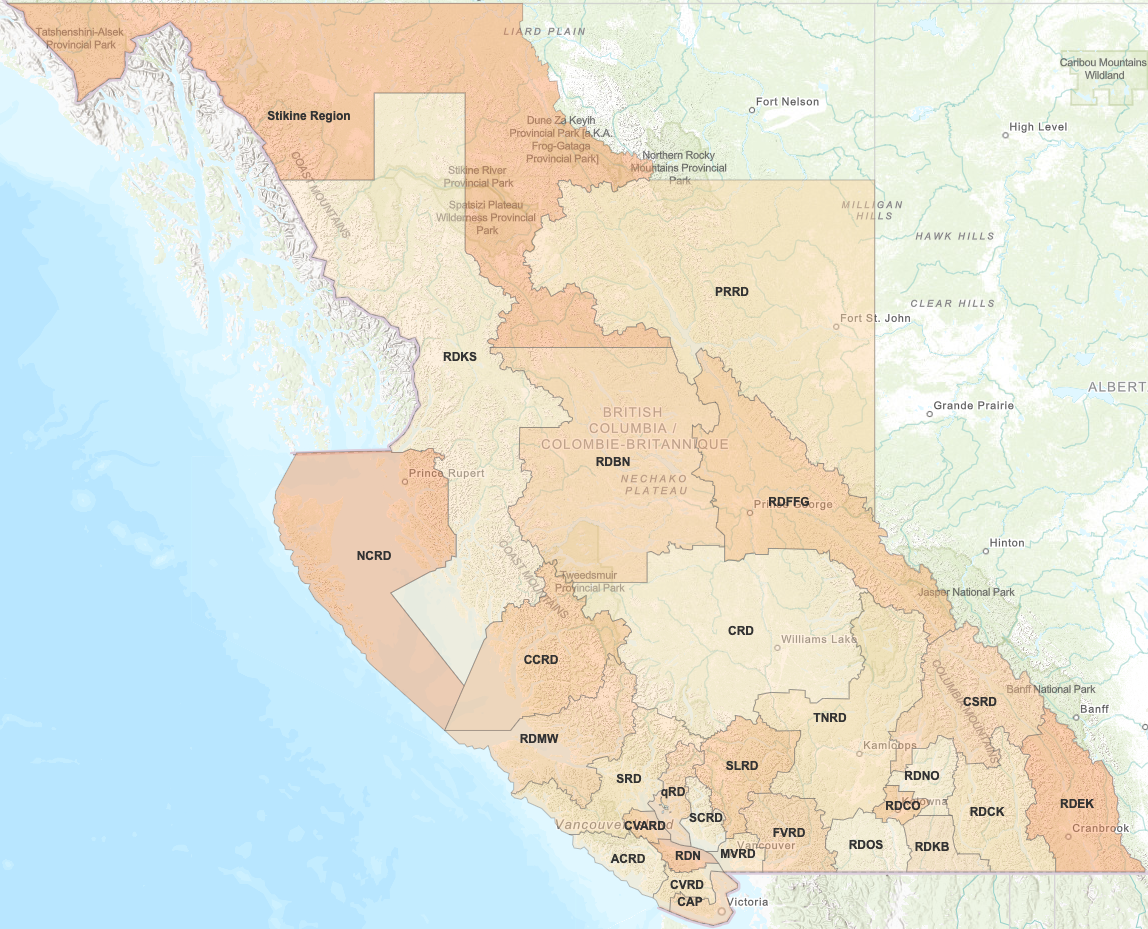Municipalities in B.C.
Municipalities in B.C. are responsible for providing local services and governance to approximately 89 percent of the province's population. There are currently 161 municipalities, ranging in population from just over 100 to over 630,000 people and ranging in size from 63 hectares to over 8,500,000 hectares.
Municipalities can be classified as either a town, village, district or city depending on the size of their population and geographic area. An older classification, township, is still referenced in the names of some municipalities; townships are currently classified as districts.
Municipalities were first established in B.C. in the late 1800s. Since then, the roles and responsibilities of municipalities have evolved over time to become more complex.
The B.C. government sets the legislation that provides municipalities with the authority and flexibility to respond to the varying needs and changing circumstances of each community. Within that framework, the B.C. government regards municipalities as autonomous, responsible and accountable government directed by democratically elected councils.
Search CivicInfoBC for information about a specific municipality, including:
- Street address, general email addresses and website
- Listing of elected officials and their contact information
- Key staff (for example, corporate officer) contact information
Municipal incorporation
Most municipalities are incorporated by the B.C. government through the issuance of a legal document called letters patent. Each letters patent contains the name of the municipality, describes or represents its boundary and establishes its classification. Early municipalities were incorporated by the Colonial or Provincial Legislature under legislative acts, although the power to create new municipalities in response to local interest was granted to the Provincial Cabinet in 1910.
The City of Vancouver is an enduring example of a municipality created and operating under a distinct piece of legislation (Vancouver Charter). In more recent years in response to unique circumstances, on rare occasions a municipality has also been created by special legislation, such as the City of Powell River and the Resort Municipality of Whistler.
The B.C. government can change a municipality's boundaries by amending the letters patent, typically following a locally-initiated restructure process. Learn more about:
Municipal governance
Municipal councils are democratically elected to make decisions on behalf of the community, and are accountable for those decisions to their electorate. Councils are composed of a mayor and councillors, and vary in size from five to eleven members depending on population of the municipality. Mayors and councillors serve a four-year term.
Municipal councils typically have full discretion to set policies, adopt bylaws and establish direction for their communities in accordance with legislation and other legal rules. Sometimes the discretion of a council may be constrained by the need for input or approval from the electors or the Inspector of Municipalities before, for example, a bylaw is adopted. Municipalities are also subject to the jurisdiction of bodies such as Ombudsperson, the Information and Privacy Commissioner and the courts.
Council oversees several key functions to the running of a municipality, including:
- Passing bylaws
- Budget planning and approval
- Committee, board and commission appointments
- General oversight of municipal administration
Due to these responsibilities, council has a close working relationship with the municipal administration which provides professional advice to council and implements its direction. Key municipal administration members are the chief administrative officer and the required municipal statutory officers (corporate officer and financial officer).
Municipalities in the regional district system
Municipalities, along with non-municipal areas (known as electoral areas) and Treaty First Nations (if any), form regional districts. Municipal councils appoint one or more members of their elected councils to sit as municipal representatives on their respective regional board.
The requirement to sit and represent on a regional board, in addition to municipal duties, is a unique aspect of the local government system in B.C.. Although sometimes challenging in practice, this reflects the key role of municipal councils in considering the most cost-effective way to provide services (directly or through the regional district) for the benefit of residents.
Municipal powers and services
Core municipal powers and responsibilities are set out in the Local Government Act and Community Charter. For the City of Vancouver, its key powers and responsibilities are set out in the Vancouver Charter. Other legislation may also provide important authorities or requirements for municipalities, including the Motor Vehicle Act, Environmental Management Act and the Building Act.
Municipalities generally have some of the broadest service authorities in Canada, to provide whichever services they consider necessary or desirable for the community. Municipalities may provide services directly or indirectly – for example, through the regional district, with a private partner or with another government.
Municipalities are not responsible for schools, social assistance or hospitals. These are a provincial responsibility exercised directly or through other bodies.
Municipal planning
Municipalities are able to control land use and development using a variety of processes and tools, including official community plans and regulations such as zoning.
Local government infrastructure
Local governments require infrastructure to deliver many of their services, including drinking water, roads, fire protection and sewage collection and treatment.
Local government support
The Ministry of Municipal Affairs provides information and other supports to municipalities:
- Local government information
- Advisory materials
- Approval on a select set of bylaws, for example long-term capital borrowing and development cost charges
- Advice on changing boundaries, municipal incorporation, and resolving local government disputes
- Conditional grants to be used for a specific purpose
- Unconditional grants to be used for any purpose the local government wishes
Related Links
Guidance & Resources
Contact information
Contact us if you have questions about municipalities in B.C.
250 387-4019
1 800 663-7867

